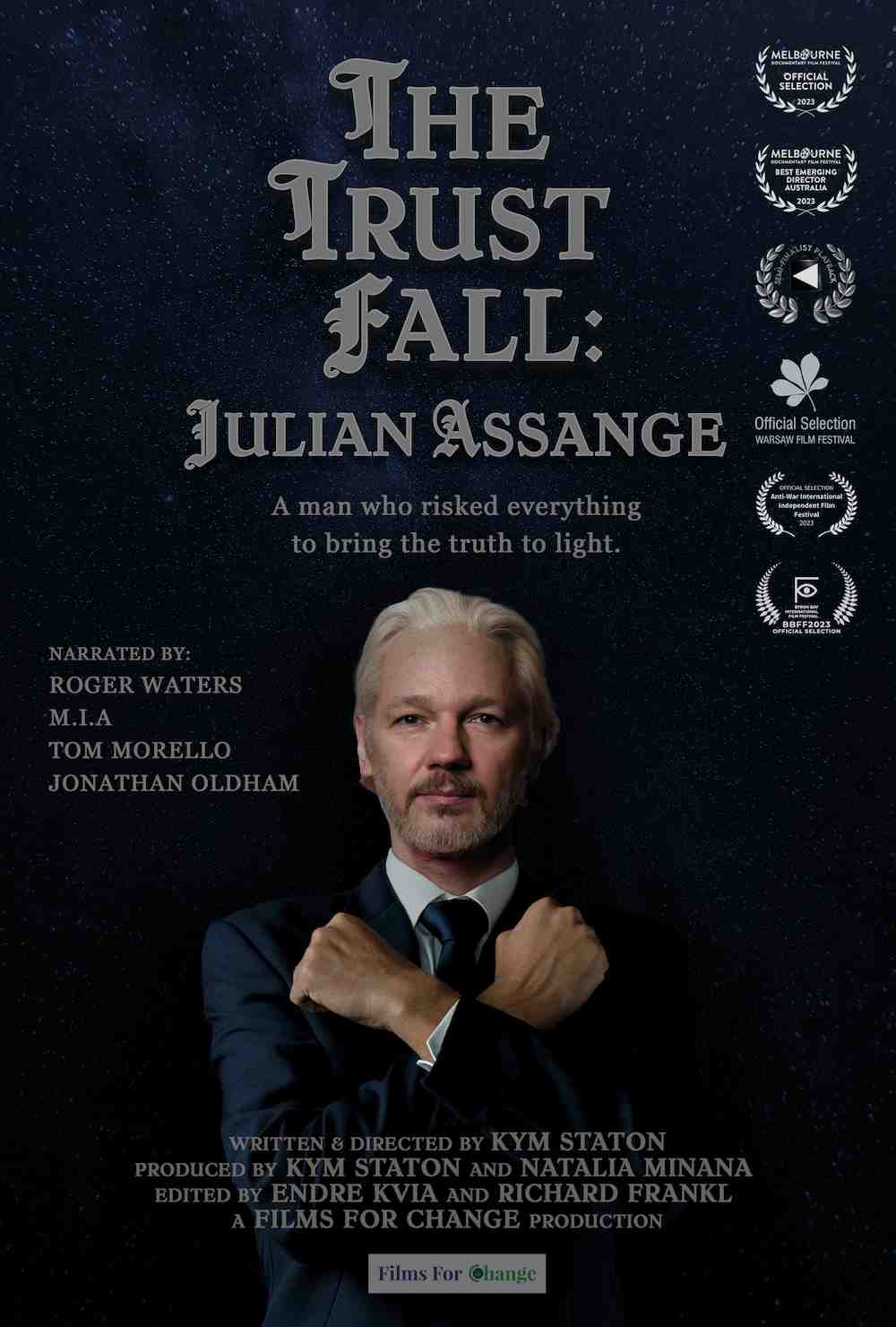David Davis reviews 'The Trust Fall: Julian Assange'
Julian Assange at his extradition hearing | Image by: Francesco Orazzini; Heather Meslar; Jun Karl Labial; Nick Simpson; Ruslan Starkov; Manja McCade & Tom Aslan (Belmarsh PrisonCell Installation “Belmarsh Live”)
3 min read
Thoroughly engaging and skilfully interspersed with animations, Kym Staton’s important film paints a searing indictment of the political persecution of one man for his journalism
“They will chase me to the ends of the earth, they will make my life hell, but it’s my obligation to make sure that the public sees this information.” A staggeringly prescient quote in Julian Assange’s own words.
Kym Staton’s new documentary, The Trust Fall: Julian Assange, begins with footage of Assange receiving the Sydney Peace Prize gold medal for his journalism at London’s Frontline Club in May 2011. It illustrates an essential point: Julian Assange is a journalist. What he is not is a government employee in breach of the United States’ Espionage Act, who must be extradited at all cost.
The film follows a timeline of Assange’s publication of disclosures from inside the intelligence community that would then seek to destroy him.
Those who have followed Assange’s persecution will remember the most damning disclosures all too well.
Grainy black-and-white video showing an Apache gunship indiscriminately opening fire on a large group of defenceless Iraqi civilians.
Several civilians, including two Reuters journalists, were killed. The gunship operatives are recorded laughing at their victims. The footage is shown in full. Its raw brutality sticks in the mind of anyone who has seen it.
The documentary hits home the reality that our extradition treaty with the US needs dramatic revision
Harrowing interviews with victims of this attack and their immediate family are shown. We hear from a young child who was wounded and only survived because his father threw himself over his son’s body to protect him.
The Trust Fall makes plain the sustained persecution Assange has faced following these disclosures.
We see leaked emails depicting a plot to move Assange “from country to country to face various charges for the next 25 years”; so far, they appear to have succeeded.
The abhorrent treatment of Assange is a stark reminder of the US government’s habit of trampling on individual rights in pursuit of its interests. The documentary hits home the reality that our extradition treaty with the US needs dramatic revision – we do not want to be a partner in what we see here.
The toll Assange’s treatment has had on his mental and physical wellbeing is unrelentingly illustrated throughout the film – perhaps most aptly by Nils Melzer, the former UN special rapporteur on torture, who says the US and United Kingdom governments’ treatment of Assange amounts to torture.
 For anyone who would prefer to remain unaware of quite how far the West is falling short in its reputation for valuing a free press, this is not the film for you. The precedent the USA has set in its treatment of Assange makes it difficult to claim the authority to lecture any country on press freedom ever again. Sadly, we are complicit in this hypocrisy.
For anyone who would prefer to remain unaware of quite how far the West is falling short in its reputation for valuing a free press, this is not the film for you. The precedent the USA has set in its treatment of Assange makes it difficult to claim the authority to lecture any country on press freedom ever again. Sadly, we are complicit in this hypocrisy.
Overall, the film paints an exhaustive picture of Assange’s tragic tale, with dozens of experts and witnesses contributing to a searing indictment of the state apparatus marshalled against him and those who have sought to defend him.
Anyone interested in the Assange case would be wise to watch this important film. It is thoroughly engaging and skilfully interspersed with animations throughout, illustrating just what Assange has gone through.
David Davis is Conservative MP for Haltemprice and Howden
The Trust Fall: Julian Assange
Written & directed: by Kym Staton
Venue: Selected cinemas, upcoming screenings: www.thetrustfall.org
